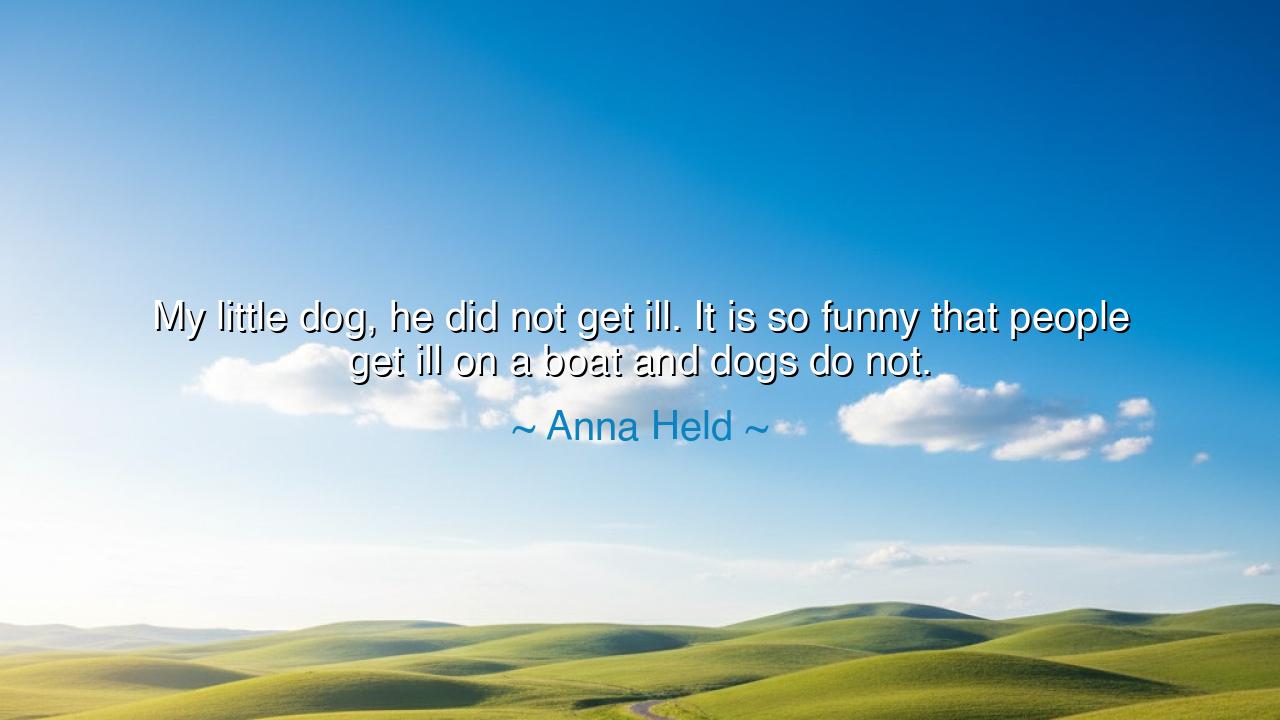
My little dog, he did not get ill. It is so funny that people
My little dog, he did not get ill. It is so funny that people get ill on a boat and dogs do not.






Anna Held, the singer and star of the stage, once remarked with playful wonder: “My little dog, he did not get ill. It is so funny that people get ill on a boat and dogs do not.” At first, her words sound like lighthearted amusement, a passing observation about the resilience of her dog against the weakness of human travelers. Yet within her jest lies a reflection older than the seas themselves: the contrast between human frailty and the simple, steadfast strength of animals.
The ancients often looked to animals as teachers. They marveled at how the lion carried its pride, how the eagle soared untroubled, how the ox endured labor without complaint. In Held’s words, the dog becomes a symbol of instinctive harmony with nature. While man, burdened by thought and expectation, sways with the sickness of the waves, the dog remains steady, unshaken by fear, content simply to exist in the moment. Her observation is humorous, but it also reminds us of the wisdom of simplicity.
There is in her quote also a meditation on fragility. Man, who builds ships to command the seas, still bends before the rocking of waves. The animal, who builds nothing, rides the same waves without distress. What greater irony than this—that with all our cleverness, we remain vulnerable, while the humble dog shows greater strength? This truth echoes the old teaching: knowledge without balance makes us weaker, but simplicity joined with trust in nature makes one strong.
History provides its witnesses. When explorers first crossed oceans to reach new lands, journals tell of crews stricken with seasickness, confined to hammocks for days. Yet the animals carried on ships—cats, dogs, even goats—showed little sign of illness. The contrast did not go unnoticed. Some sailors even took comfort in watching the calmness of animals, believing that if the beasts were at ease, then the storm would not be their end. Thus Held’s words echo a truth known to seafarers for centuries: the natural world often outlasts human fear.
And yet, Held’s tone also carries laughter. She is not merely lamenting human weakness, but marveling at it with joy, finding humor in the contrast. Here lies another lesson: that we should not always grieve our shortcomings, but smile at them. To see our fragility with lightness is itself a kind of strength. In this way, Held teaches us not only about resilience, but also about the healing power of laughter in the face of life’s little humiliations.
The lesson, then, is twofold. First, learn from the dog—to live in balance with nature, free of the anxieties that make us weaker. Second, learn from Anna Held herself—to meet the ironies of life with humor, not despair. For seasickness, like many troubles, passes quickly, but the ability to smile at our own frailty is a treasure that endures.
Therefore, let her words be remembered not only as a jest, but as a teaching. Man may stumble where animals endure, yet man is also gifted with the power to laugh at his stumbles. In this balance of humility and humor lies wisdom. Watch the animals, honor their simplicity, and when life rocks your vessel as the sea rocks a boat, do not sink into despair. Instead, laugh, endure, and carry on—like the little dog who, without complaint, rides the waves unshaken.






AAdministratorAdministrator
Welcome, honored guests. Please leave a comment, we will respond soon